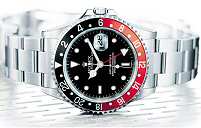Is That A Rolex On Your Wrist (Or Are You Just Happy To Sport A Fake)?
September 11, 04
By Edahn Golan
It’s estimated that about 10 percent of American online buyers have purchased counterfeit goods. That is a staggering statistic, but not altogether surprising when considering a recent lawsuit that Tiffany & Co. brought against eBay, alleging that nearly three quarters of Tiffany brand name jewelry sold on the site was counterfeit.
Think about it for a minute - what does that tell you about the buyers? That they are unlucky buyers duped by unscrupulous sellers? Perhaps they are honest buyers, who just know that a $1,000 mint condition Rolex watch offered for $200 is not the real McCoy.
|
|
Yes, branding and marketing works, and most everybody wants something they can’t afford and will settle at times for a similar item. But every now and then buyers find themselves tempted to buy a pair of fake Gucci sunglasses for an unbeatable $10 and a chance to acquire a little glamour.
But at other times, matters are not that simple. When someone really wants to fool you, it won’t be by offering products at ridiculously unrealistic prices. BusinessWeek Online asked a number of experts for advice on how to avoid falling into the traps set by online swindlers.
The first tip, after “If the price seems too good to be true, it probably is”, was: “Whenever possible, work with reputable online retailers,” from JupiterResearch analyst Monique Levy, who added that consumers should check out the web sites of bricks-and-mortar retailers first to discover if they can return questionable goods to the store in person. Stores are also the best place to make a complaint - face to face and with the goods in your hands.
Consider the site’s look. Scammers usually are so fly-by-night that their sites look, frankly, cheap. Dennis Prince, who writes about online auction sites, suggests checking if the company’s phone number is listed and working before making a purchase.
Ask questions! Yes, as simple as that - ask for an appraisal report for an expensive item, such as an antique, just like our clients ask for lab certificates for our diamonds.
On sites that offer seller ratings, such as eBay, check them along with comments from buyers. Is there a common complaint about the accuracy of description or late delivery?
The recommendation I liked most was to use an escrow account for expensive items. But this is not just a smart way to protect ourselves as buyers. As sellers, we might want to offer it on our own e-commerce sites to increase the sense of security on the part of our clients and potential clients.
For a fee of several percent of the purchase price, an escrow service will hold the payment until the buyer receives the purchased item and approves it. Buyer and seller can agree to split the fee evenly between them.
I want to take this point a little further. We are operating in a business environment that stands and falls on our good reputation. Every single piece of advice offered to buyers is also a suggestion for sellers: be available to answer all questions about your goods, be honest in your descriptions and deliver on time, as promised.
Think about what bugged you about other sites and then go and examine your own business. If there is anything that needs to be corrected, then do it.
